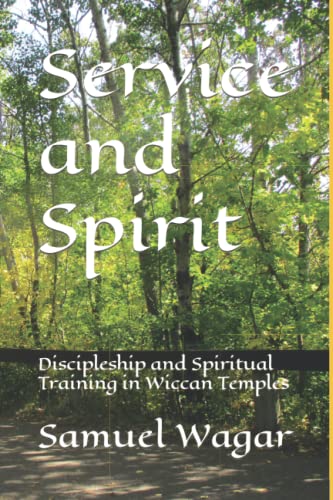Samuel Wagar is a Wiccan theologian, which is a peculiar specialty if only because of its rarity. With more than a dozen academic publishing credits in related fields he is a serious-minded academician. This makes him something of an oddity in the "pagan publishing" space. In and of itself this is neither compliment nor condemnation; the spiritualist can impart profundities, and the academician can get lost in the rhetorical woods, and vice versa. His most recent work, "Service and Spirit: Discipleship and Spiritual Training in Wiccan Temples (A Modest Proposal)" is firmly in his wheelhouse, being a deep dive on the best practices for Wiccan Temples, how to create such a thing and maintain it, and why you'd want to go to that trouble in the first place. It is important to note up front for potential readers that he is not of the school that uses "Wicca" and "(neo-)Pagan" interchangeably; when he says "Wicca" he means that which is descended from Gardner & co. (Exactly which branches he prefers is beyond the scope of the book and this review.) So that's the wind up; how's the pitch?
Well, thorough for a start. He first identifies the issue that is at the heart of his desire to write this book, which is the self-perpetuation of Wicca. The religion has survived beyond the phase of any new endeavor where the excitement of the founders can fuel growth and overcome obstacles, and is now in a maturing state that has to rely on itself more than any one (or group of) charismatic leaders. As he says, "[f]or it to continue to exist into the many generations, to grow in numbers and influence, it needs to take steps that other successful new religions have - it needs to build institutions and needs to accumulate and build on its capital both spiritual, intellectual, and material." This way of thinking is immediately going to cause tension in some readers, as this sounds a lot like the religious experience that so many pagans had bad experiences with in their younger days. It's important to remember, again, that Wagar is writing very particularly about Wicca in the original sense - a formal initiatory mystery cult, not the "Wicca-identified movement... the amorphous more-or-less New Age individualism of the rapidly growing 'Witchcraft groups". Having set his course, he navigates very deliberately from point to point: how to "plant" a new temple (and how not to), what the underlying practices should look like, identifying and developing both spiritual leaders and organizers who can keep the ship operational, how outreach to the broader community can work, setting rules for the behavior of temple members and even the necessity of discipline and what forms it should take when the rules are broken.
It seems like I'm saying this several times, but it's important: this book's value is inextricably tied to the needs of the reader. If you're a solitary practitioner or are a part of a "typical" modern coven (for our purposes here, a single group of practitioners gathering together to mark esbats and/or sabbats, and for other purposes as they see fit) then "Service and Spirit" cannot rise to more than an intellectual curiosity. Not only that, but you should be aware that while he might dispute this characterization, the language with which he contrasts Wicca and (neo)-Paganism can feel condescending. The quote I mentioned in the previous paragraph concerning the 'Wicca-identified movement' goes on to say '[t]he individualist segment is centered on solitary, individual practice and operant magic with very little depth and no theology to speak of.' It's not that I want go 12 rounds on the underlying facts supporting his comments, but it's not all that fun to read. Then again, I'm fairly sure Wagar himself would acknowledge (happily, even) that 'fun' wasn't really what he had in mind when he wrote this book, so fair enough! In any case, the value of this book to the reader will rise immensely if you've actually got it in mind to formalize your tradition - if, say, your coven seems to have legs and could outlive its founders, preparing for that future could be easier by reading Wagar. And, naturally, if you are from the 'more formal magical orders' then you may be keenly interested in our author's thoughts about perpetuating religion.
A book by Samuel Wagar is going to be an unusual read for people that are used to the typical literature of the occult bookstore. Wagar is an academic who happens to be spiritually inclined, and his work often reflects this - an academician interested in spiritual topics, rather than a spiritualist who happens to have studied. As I said earlier, this is not a value statement- there can be good and bad from either end of the spectrum. He has definitely done the heavy lifting insofar as research goes; his listing of various source types at the end of the book runs seven pages, and the text itself is extensively footnoted. I can happily recommend the book within its target audience, but as a general interest read I suspect a reader would quickly find themself moving on. It's an ideal book to round out a library that aims to be both broad and thorough.
~review by: Wanderer
Author: Samuel Wagar
Obscure Pagan Press, 2022
144 pp., $12.00
Service & Spirit: Discipleship and Training in Wiccan Temples

©
2010 - 2026
Facing North
